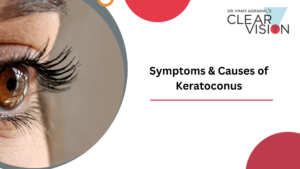What is Keratoconus?
Keratoconus is a progressive eye condition that results in thinning of the cornea. The cornea is the dome-shaped clear front surface of the eye. In people with keratoconus, the cornea becomes thinner and develops a cone-like shape. This irregular shape prevents light from entering the eye properly, resulting in blurred vision.
Keratoconus affects both eyes and commonly begins during adolescence or young adulthood. In some cases, it may progress rapidly, while in others, it may progress slowly or not. There is no cure for keratoconus, but treatments are available to improve vision and prevent further progression.
What causes keratoconus?
The exact cause of keratoconus is not fully understood, but it is believed to result from a combination of genetic and environmental factors. Some of the possible factors that may contribute to the development of keratoconus include:
Genetic predisposition: Keratoconus tends to run in families, and evidence suggests that certain genes may be involved in its development.
Eye rubbing: Frequent and vigorous eye rubbing can put excessive pressure on the cornea, which may weaken and thin the tissue over time.
Allergies: Chronic eye allergies and other types of eye inflammation may also contribute to the development of keratoconus.
Connective tissue disorders: Keratoconus has been associated with certain connective tissue disorders, such as Ehlers-Danlos syndrome and Marfan syndrome.
It is crucial to note that not everyone with these risk factors will develop keratoconus, and the condition can also occur in people without any known risk factors.
The Different Stages of Keratoconus
Early Stage Keratoconus
At the early stage of keratoconus, the cornea becomes thinner and begins to bulge outward in a cone shape. This cone-shaped deformity causes light to scatter as it enters your eye, which results in blurred vision.
While there is no cure for keratoconus, treatments are available to help slow or arrest the progression of the disease and improve vision.
Early stages keratoconus treatment
Contact lenses or eyeglasses are used to treat keratoconus in its early stages. Spectacles assist the patient in seeing clearly and correcting myopia and astigmatism. The optimum option while engaging in sports activities is thought to be soft contact lenses with spherical or toric adjustments.
Modern Laser based methods using what is known as Cretan protocol can be used to improve vision along with Corneal collagen cross-linking
Modern diagnostic instruments like corneal topography available at Clear Vision help in early detection and accurate monitoring of the condition.
Keratoconus can cause significant vision loss and difficulty with daily activities such as driving and reading and may require more advanced treatments such as Corneal collagen cross-linking.
Corneal collagen cross-linking is a procedure used to prevent keratoconus from progressing to advanced and severe stages. It acts through the hardening of the cornea. Doctors anticipate that this procedure will greatly reduce the number of corneal transplants performed on patients and make contact lens fitting easier. It has been successfully used to arrest or slow the progression of up to 97% of cases.
Moderate Stage Keratoconus
At the moderate stage of keratoconus, the cornea has become thinner and more cone-shaped. The condition typically affects both eyes, but one may be worse. Additionally, moderate keratoconus usually causes more severe symptoms than early-stage keratoconus. These symptoms can include:
- Blurry vision
- Distorted vision
- Double vision in one eye
- Glare and halos around lights
- Increased sensitivity to light
Moderate keratoconus treatment
For people with intermediate keratoconus, Scleral contact lenses are considered the best option because they offer a superior vision to glasses. These lenses are available in mini scleral form with diameters ranging from 14.5 to 24.0 mm.
They correct roughly 90% to 95%of the corneal distortion in your eye and use a standard rigid surface to cover the complete corneal irregularity.
Rigid gas-permeable lenses that are enclosed in soft material are hybrid lenses. They also offer superb comfort and stability, along with excellent viewing quality.
If your eyes itch or your lenses disappear, you can use emergency eyewear as a backup. Although they cannot completely correct your vision, these glasses can be a backup in some circumstances.
Advanced keratoconus
Advanced keratoconus refers to a more severe condition, where the cornea becomes thinner and distorted.
Early diagnosis and management of keratoconus are important to prevent it from progressing to the advanced stage.
Advanced keratoconus treatment
Advanced keratoconus is treated with a specialised rigid gas permeable contact lens design. They include more alterations in their design by considering a much steeper inner curve to maintain proper lens fitting. Large mini scleral or rigid gas-permeable contact lenses are excellent for persons with an abnormally shaped cornea. They vault the cornea and increase stability and comfort in the eyes.
Severe keratoconus
Corneal thinning, scarring, and distortion in a dramatic way are common in severe keratoconus.
With stiff gas-permeable contact lenses, eyesight is frequently poor, contact lens tolerance is significantly reduced, and it’s typically quite challenging to properly fit a rigid gas-permeable contact lens.
It is advised to consider a corneal transplant at this stage by a skilled corneal surgeon.
Severe keratoconus treatment
Patients with severe keratoconus must have a Deep anterior Lamellar Keratoplasy DALK (corneal transplant surgery) because they cannot be treated with eyeglasses or specialty lenses. For a corneal transplant, you can recommend a skilled corneal surgeon. The use of Cornea crosslinking and Advanced Laser and contact lens technology has reduced the need for cornea transplants when intervention is done in time.
Consult a skilled surgeon at Clear Vision Eye Centre for keratoconus treatment
Clear Vision Eye Centre is a renowned and comprehensive eye clinic in Mumbai for treating cataracts, Keratoconus, Glaucoma, and other ophthalmic disorders. Founded and conducted by Dr. Vinay K Agrawal, who is widely commended as one of the most trusted Ophthalmologists. The team of professionals at Clear Vision ensures complete patient comfort and prompt recovery by paying personalised attention to every patient before and after their treatment.




